We asked respondents in the survey how many countries they had traveled to outside their own. The share of people who have traveled to a different country ranges from a low of 3% in India to more than 99% in Sweden and the Netherlands. Overall, a median of 79% across the 24 countries surveyed say they have been to at least one other country. A median of 21% have not traveled outside their home country.
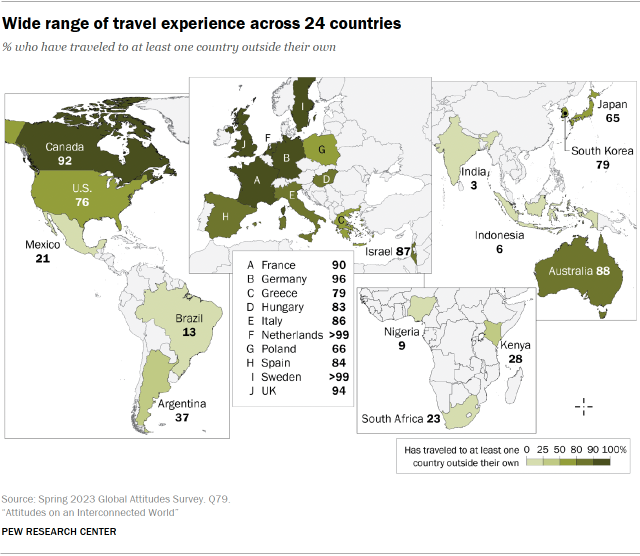
There are large differences by region, with Europeans especially likely to have been to a country other than their own: About two-thirds or more in every European nation surveyed have traveled outside their country. These places tend to be geographically smaller than countries we surveyed in other regions and close to a relatively large number of other countries. And people who live within the European Union have the right to free movement, which allows them to travel, work or live in other EU countries with few restrictions.
By contrast, roughly a third or fewer have traveled outside their home country in India, Indonesia and the Latin American and African nations we surveyed.
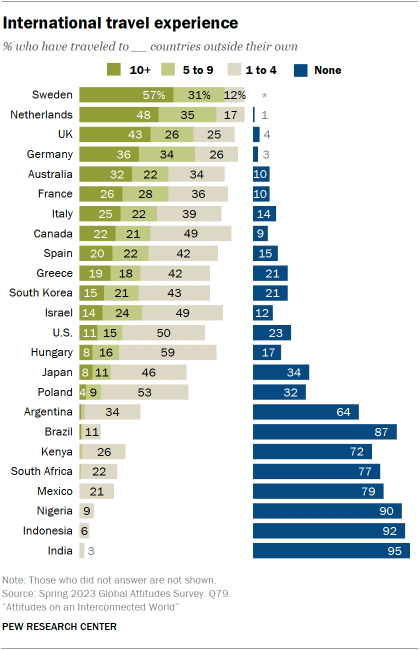
In some countries, not only is there a large share of people who have traveled, but many people have traveled widely. A median of 34% have traveled to between one and four countries, 17% have traveled to between five and nine, and 13% have traveled to 10 or more.
Again, Sweden and the Netherlands stand out among the nations surveyed. A majority in Sweden and around half in the Netherlands say they have visited 10 or more countries. And around a third in both nations have traveled to between five and nine countries.
In the U.S., while roughly three-quarters have traveled to at least one other country, only 11% have been to 10 or more.
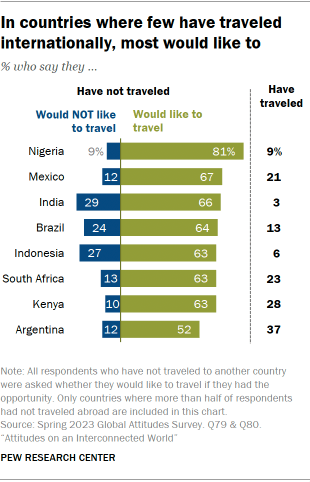
In India, Indonesia and the Latin American and African nations surveyed, only around 3% or fewer have been to five or more countries. Majorities in these countries have not traveled internationally at all, but most say that if they had the opportunity to travel outside their country, they would like to.
Kenyans are the most interested in international travel, with 81% saying they have not traveled but would like to visit another country if they had the chance.
Still, there are some who have no interest in travel. For example, 24% in Brazil, 27% in Indonesia and 29% in India say that they have not traveled internationally and, if given the opportunity to travel to another country, they would not want to.
Income and international travel
While the physical size of the country or the region it’s in may play some role in people’s travel behavior, it is not the only explanation. Economic factors are also important.
Higher-income countries have much higher rates of international travel. For example, Sweden and the Netherlands are among the richest nations we survey, and in both places nearly all respondents said they had traveled to another country.
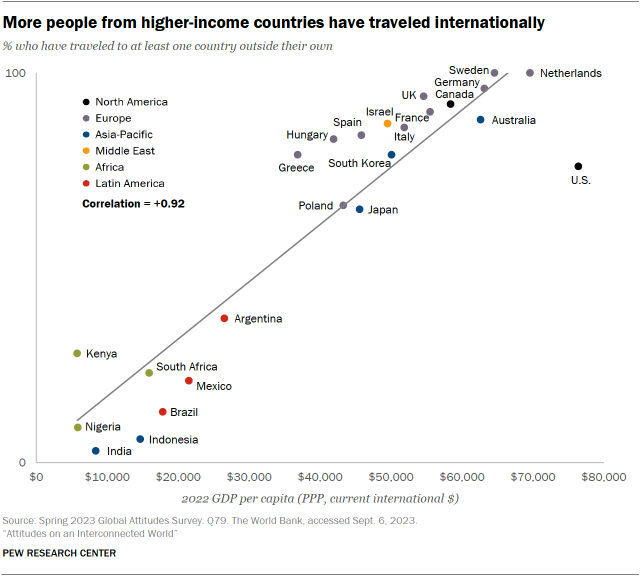
The U.S. departs a bit from this pattern. While it is the wealthiest country surveyed in terms of gross domestic product per capita, about half of the other countries surveyed have higher rates of international travel than the U.S.
On the other end of the scale, very few people say they have traveled outside their country in Nigeria, India, Indonesia or Brazil, all nations with relatively low GDP per capita.
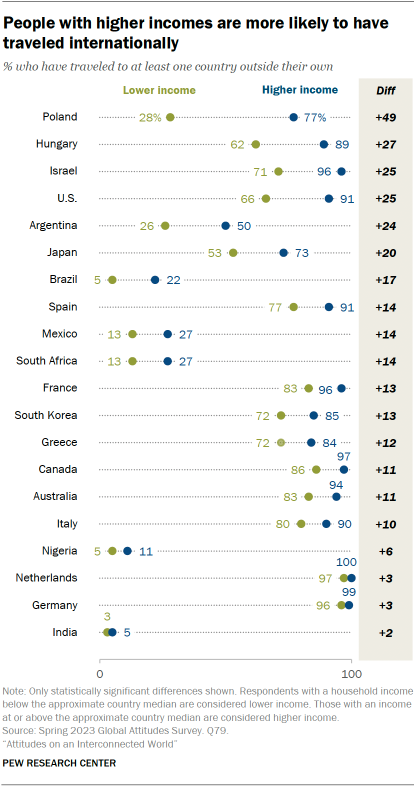
And of course, personal finances are related to international travel experience. In 20 countries, people with a higher income are more likely to have traveled to another country. For example, 91% of Americans who earn more than the median income have traveled outside the U.S., compared with 66% of those who earn less than the median.
In the high-income countries surveyed, higher earners are more likely to have traveled to 10 countries or more. In the Netherlands, 61% of people with a relatively high income have been to at least 10 other countries, compared to 29% of people with a lower income.
People with more education are also more likely to have traveled internationally in 18 countries.
There are very few age differences in travel experience, but in countries where few people have traveled overall, adults under 40 are more likely to say they would like to travel outside their home country if the opportunity arises.
Travel and international engagement
People who have traveled to more countries tend to feel more connected to others around the world.
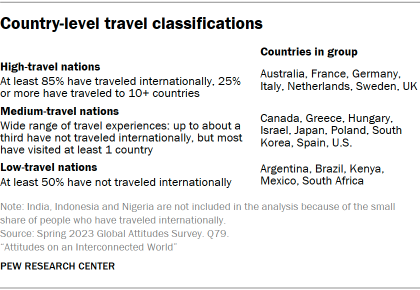
Because there is such a large range of travel experience across countries, we classified people as having relatively high or low travel experience using different criteria depending on the country they’re from.
We divided the survey countries into three groups: high travel, medium travel and low travel. Countries where most people have traveled internationally and a quarter or more have traveled to at least 10 countries are considered high-travel nations. Countries where at least half have not traveled abroad are considered low-travel nations. All other survey nations – except India, Indonesia and Nigeria, where the share of people who traveled internationally is too small to analyze – are considered medium-travel nations.
Here is how we classified individuals into high or low travel experience:
- In high-travel nations, people who have traveled to 10 or more countries are classified as having relatively high travel experience. If they’ve traveled to fewer than 10 countries, they have low travel experience.
- In medium-travel nations, people who have traveled to five or more countries are considered to have high travel experience. If they’ve traveled to four countries or fewer, they have low travel experience.
- In low-travel nations, people who have traveled to at least one country have high travel experience. People who have not traveled abroad are classified as having low travel experience.
Regardless of the way they are grouped, people who have more travel experience than others in their country are more likely to say they feel somewhat or very close to people all over the world in most of the countries surveyed.
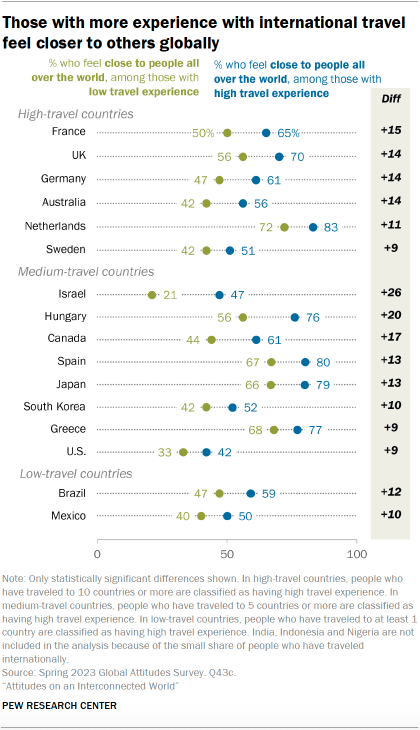
For example, 70% of Britons with more travel experience say they feel a connection with others around the world, while 56% of those with less experience say the same.
Travel experience is also related to the role that people want their country to play in world affairs.
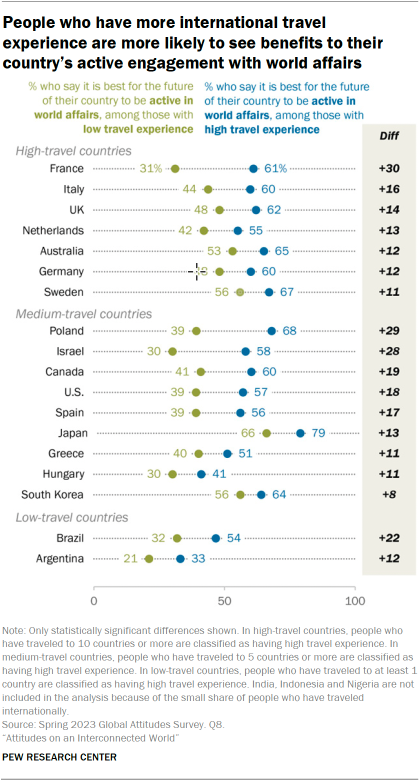
In France, people with a lot of international travel experience are almost twice as likely as those with less experience to say that being active in world affairs is what is best for France’s future.
We see a similar pattern in 17 other countries, including high‑, medium- and low-travel nations.




